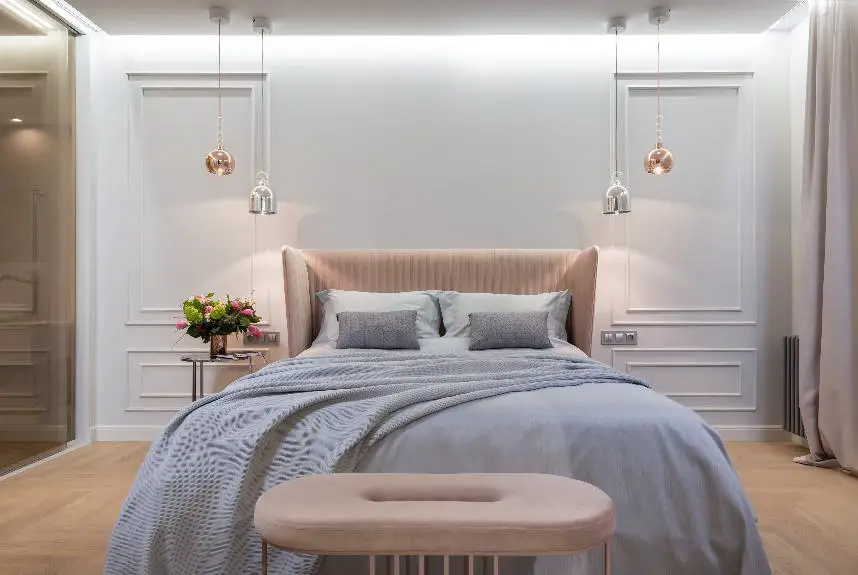Deciding to put plants in your bedroom can affect your health and room’s appearance. Some plants can clean the air by removing toxins and producing oxygen, which might help you sleep better. They can also make the room feel peaceful and help lower stress.
People are sometimes worried about plants using oxygen and releasing carbon dioxide at night, but this effect is too small to harm human health.
Let’s now examine these concerns and the benefits of bedroom plants.
Benefits of Bedroom Plants
Bedroom plants can purify the air, improve sleep, and reduce stress. They produce oxygen and remove pollutants, which is beneficial for indoor air quality, especially at night to aid in better sleep. These plants absorb harmful toxins like formaldehyde and benzene, found in common household items, and can improve respiratory health and decrease allergic reactions. The humidity from plants can also relieve dryness in rooms with heating or cooling systems.
Additionally, plants in the bedroom can help lower stress and improve mental health by creating a calming environment that supports relaxation and can reduce symptoms of anxiety and depression.
Many bedroom plants are low-maintenance and can thrive with basic care, such as sufficient light, water, and occasional fertilization, making them a simple yet effective addition to the bedroom.
Common Concerns Addressed
Safety concerns related to having houseplants in bedrooms are common. One issue often raised is whether plants release carbon dioxide at night during respiration. Research shows that the amount of carbon dioxide houseplants emit is very small, much less than what humans breathe out. Therefore, there is no health risk from plants’ carbon dioxide in a bedroom.
It is also incorrect to believe that plants produce carbon monoxide; they do not release this toxic gas. Some plants, like the Snake Plant and Peace Lily, are known for their air-purifying properties. A NASA study identified these as plants that can enhance air quality by releasing oxygen at night.
These plants are also low maintenance, as they can grow in indirect or low light conditions, reducing the need for frequent movement and minimizing the chance of them being knocked over. By choosing suitable plants and placing them correctly, they can improve sleep quality and overall well-being without posing any safety risks.
Adding plants like the Snake Plant and Peace Lily to a bedroom is consistent with health recommendations and feng shui principles.
Best Plants for Sleep
Several plants are known to aid sleep and are suitable for bedrooms. Spider Plants are effective at air purification and can help create a cleaner sleeping environment. Aloe Vera releases oxygen at night, improving air quality for better sleep and removing common household chemicals. Snake Plants (Mother-in-Law’s Tongue) also improve air quality by converting carbon dioxide to oxygen at night and are easy to maintain.
Peace Lilies can purify the air and increase room humidity, assisting in a more restful sleep. Areca Palms, which serve as a natural humidifier and air purifier, add greenery and elegance to bedroom spaces. Lavender’s scent has a calming effect that may lower blood pressure and stress, enhancing sleep quality. Golden Pothos contributes to air purification, supporting a peaceful sleep environment.
These plants can make bedrooms more inviting and may improve sleep health.
Plants and Air Quality
Research shows that keeping houseplants in the bedroom can improve air quality by reducing indoor pollutants and increasing oxygen levels. During the day, plants release oxygen through photosynthesis. At night, they emit carbon dioxide, but in very small amounts that don’t affect the room’s oxygen balance, especially with good ventilation.
Particularly effective plants for air purification include the Areca Palm and Peace Lily. These plants absorb toxins and emit oxygen, which helps to create a cleaner breathing environment. A NASA study has identified that certain plants can remove harmful substances like formaldehyde and benzene from the air.
Plants also help regulate humidity by releasing moisture vapor during transpiration, which is beneficial for respiratory health and comfort. Additionally, the presence of plants may improve mental well-being by creating a feeling of vitality.
Caring for Bedroom Plants
Plants release carbon dioxide at night, but this has little effect on bedroom air quality and poses no health risks. It’s important to know each plant’s light requirements. Many bedroom plants thrive in indirect sunlight, with a sheer curtain providing adequate filtering for some.
To care for bedroom plants, choose locations that suit their light and space needs. For example, a Peace Lily may do well on a bedside table with indirect light, while a ZZ Plant may prefer a bedroom corner. Easy-care plants like Pothos and Spider Plants are adaptable to various bedroom conditions.
Water plants according to their needs and the room’s humidity, avoiding overwatering by checking if the soil is dry before watering again. The Snake Plant is a low-maintenance option suitable for bedrooms, known for improving air quality.
Potential Drawbacks
Adding plants to your bedroom can improve the atmosphere but also has potential downsides, including air quality concerns and the need for maintenance.
Plants release carbon dioxide at night, and too many can affect air quality and disrupt sleep. Additionally, plants require regular care to prevent mold, which could cause problems for those with allergies or respiratory conditions.
While a moderate number of well-maintained plants should not pose significant issues, it is important to consider these factors to ensure your bedroom remains a restful environment.
Making the Right Choice
Choosing the right plants for your bedroom is important for improving air quality and sleep. Opt for air-purifying plants to eliminate toxins and increase oxygen supply, especially during daytime hours.
Select low-maintenance plants that thrive in low to moderate light, typical of bedroom environments. Choose plants that don’t need frequent watering to avoid mold and excess humidity, which can disrupt sleep.
Place plants in stable pots to prevent accidents, and position them safely to avoid the risk of them falling. A well-chosen selection of plants can enhance the calmness and healthiness of your bedroom.
Consider personal preference and the decor of your room when adding plants. A variety of suitable options can help turn your bedroom into a peaceful and beneficial space.





